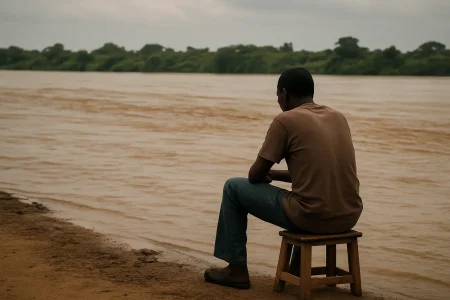
There was a time we suffered and smiled. Not because life was easy, but because dignity still meant something. Fela Kuti sang it as prophecy and protest: a people enduring unbearable conditions, still managing to carry rhythm in their pain.
But the rhythm is gone. And the suffering has turned silent.
According to security expert Kabir Adamu, speaking on ARISE TV, over 17,000 Nigerians have died in insecurity-related violence in just two years. In Benue alone, Amnesty reports 6,896 deaths. Other sources say 1,098. The figures disagree because the grief is no longer shared. Mourning has become mathematical.
We are not grieving less. We are grieving alone.
Last week, we spoke of distraction. This week, the mask has dropped. What’s left isn’t rage—it’s exhaustion. The living are tired. And the dead keep increasing.
Even the Pope’s prayer for Benue was louder than our own leaders. When condolence must come from Rome, and our own president’s visit feels more like a formality than a reckoning, what does that say about who is truly listening?
In Nigeria today, the wicked sleep well. But the helpless lie awake, not out of guilt, but out of fear. The old saying—“no sleep for the wicked”—has collapsed. We have reversed the proverb. Eyes stay open, not for vigilance, but because danger no longer announces itself. It just arrived.
And in this space, something deeper is happening.
We’re not just dying. We’ve stopped expecting to live. We’ve accepted that to exist—barely—is enough. We have normalised survival and called it strength. But survival is not the same as life. It is a waiting room. A limbo. A long corridor outside something we no longer believe we deserve.
Fela warned: “Suffer suffer for world, enjoy for heaven.” But even that lyric feels out of reach now. There’s no enjoyment waiting. Only the sound of Nigerians just knocking on heaven’s door—not in protest, not in prayer, but in quiet resignation.
And still, the headlines pile up. The graves deepen. The voices grow quieter. The regions splinter. People reach for an ethnic identity, not out of pride, but to hold onto some scrap of meaning. Something they can name. Something that still says: I exist.
But even that has become a whisper. A people who once suffered and smiled, now suffer and fall silent. Not because we have no words, but because we no longer believe anyone will answer.
But even as we knock—just knock—something lingers in the act itself. The door may not open. But the knocking means we haven’t walked away. Not yet.
I wonder what it means that we still reach out, even without a reply.
Perhaps it’s not hope exactly. Perhaps it’s memory. Or refusal. Or something older than both—some quiet insistence that our lives should mean more than this.
We have suffered. We are suffering. But maybe the greater tragedy isn’t the dying—it’s forgetting that we are still alive.
And if we are, even barely, even bruised—what might still be possible between us?
References & Source Attributions
Kabir Adamu, Security Analyst – Interview on ARISE TV
- 17,000 Nigerians have died due to insecurity within the first two years of the Tinubu administration.
- Reports an estimated 6,896 deaths in Benue State due to violence and insecurity.
- Offers an alternative death toll of 1,098 in Benue, highlighting the discrepancy in official vs independent accounts.
- The Pope’s public prayer for the victims of killings in Benue contrasted with local political silence.
- Lyric referenced: “Suffer suffer for world, enjoy for heaven” – used thematically to frame the cultural history of endurance and spiritual postponement of joy.
- A common saying originated from biblical text and was reinterpreted in the context of Nigeria’s current insecurity, where it’s now the helpless who cannot sleep.




